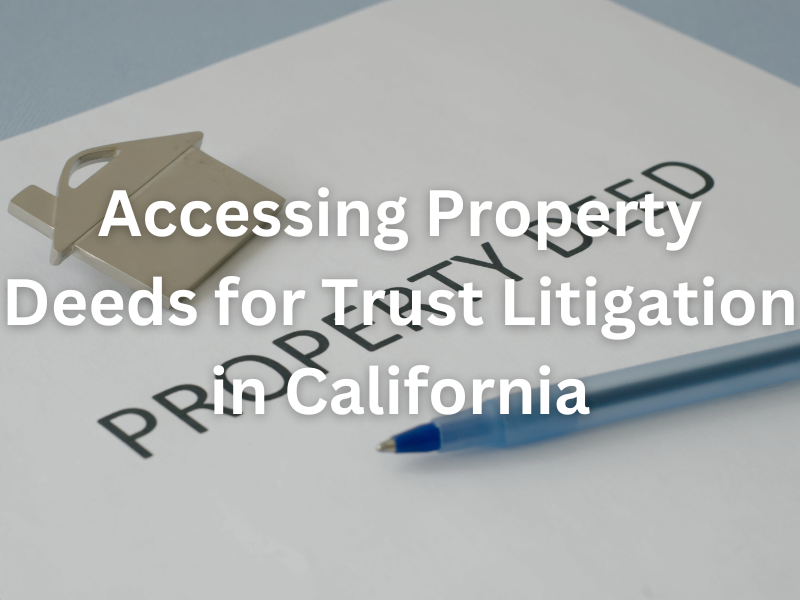
Putting property deeds in a trust allows you to transfer property directly to your beneficiaries upon your death and maintain full rights to the property while still living. Establishing a living trust also allows your beneficiaries to avoid going through the probate process to settle your estate upon your death and generally makes administering your estate easier.
Trusts are increasingly used in estate planning to safeguard assets and the property deeds or titles associated with them. When all legal requirements are met, property in a trust transfers smoothly according to the decedent’s wishes.
When disagreements arise about the status of property in a trust, litigation may be required to ensure the trust is administered according to its terms and the intentions of the grantor. Legal objections to the validity of a trust or how it is being administered are known as trust contest cases.
The trust contest attorneys at Albertson & Davidson, LLP help individuals and families in California work through trust disputes. We handle trust contest litigation on a contingency fee basis and can meet with you to discuss whether a trust contest lawsuit is appropriate in your case.
You can reach our law firm online or call (800) 601-0170 to speak with a California trust contest lawyer about fighting for your inheritance.
Understanding Deeds of Trust in California
A deed of trust is a legal document used when financing real estate transactions. Instead of taking out a mortgage, the buyer uses a deed of trust and promissory notes attached to it to transfer the property’s title to a third party, such as a bank or another entity, to hold until the borrower pays off the loan.
Under a deed of trust, the borrower has full use of the property during the life of the loan and assumes full ownership when the loan is fully repaid.
A deed of trust may also be used to establish a land trust in California. This creates a third-party trustee to hold title to real property while allowing the trust grantor to maintain all rights to and use of the property. Celebrities, the wealthy, or companies that don’t want to disclose development plans might consider the privacy a land trust provides.
Property Deeds in California
 A property deed is a legal document that establishes ownership of real property and rights of ownership. In addition to identifying the owner, a property deed contains detailed information about the property, such as its location and size and whether there are any encumbrances on the property.
A property deed is a legal document that establishes ownership of real property and rights of ownership. In addition to identifying the owner, a property deed contains detailed information about the property, such as its location and size and whether there are any encumbrances on the property.
An encumbrance is a claim against real property by an entity other than the owner. Common types of encumbrances against real property include liens, easements, and restrictive covenants.
Recording a property deed as required by California’s real estate rules protects your rights to the property by establishing your ownership and maintaining a clear title claim to the property.
Individuals or couples who have established a living trust typically transfer their real property into the trust. This requires executing a new deed reflecting the name of the trust, which must be notarized. It also requires filing the deed with the County Recorder’s Office and paying a transfer fee. Care must be taken that the exact legal description in the existing deed appears on the new deed.
Once the transfer has been executed, the trust legally owns the property, and the trustee in charge of the trust has legal authority and responsibility for the property. In most cases, the individual or couple who established the trust serves as its trustee. Upon the death or incapacity of the original trustees, they name a successor trustee to serve as the trust administrator.
Placing your home or other real estate in a revocable living trust allows the successor trustee to automatically assume responsibility for it upon your death without going through California probate court. Real estate in an irrevocable trust is protected from creditors or lawsuits because ownership lies with the trust, not the trustee.
Most people hire an estate planning lawyer to help them establish a trust and transfer property deeds into the trust. But if trust disputes arise, you may need to pursue contest a trust or pursue trust and estate litigation. You should work with a law firm that handles trust contests and litigation pertaining to inheritance disputes.
Transfer on Death Deed: An Alternative Property Deed with Heirs in Mind
A newer type of property deed available in California allows your heirs to avoid probate court and seamlessly assume control of the property upon your death.
A transfer on death (TOD) deed, also called a “beneficiary deed,” allows you to designate a beneficiary who assumes ownership of the property when you die. It works like the beneficiary designation on a life insurance policy or a paid-on-death account held by a bank.
Establishing a TOD requires completing a form, having it signed by two witnesses and notarized, and recording it with the County Recorder’s Office where the property is located. With a TOD, you maintain full ownership of the property while alive, and the TOD is revocable if your plans change.
Guide to Accessing Property Records in California
In each California county, the County Registrar-Recorder/County Clerk maintains property ownership information. In accordance with the California Public Records Act, the public may request and inspect reasonably identifiable records.
At the office of the Los Angeles County Registrar-Recorder/County Clerk, real estate records for Los Angeles County since 1850 are available for a fee in person or by mail or fax.
To obtain records online, you must use a private company, such as LexisNexis (which the L.A. County Registrar-Recorder/County Clerk site suggests) or Property Records of California, a SoCal-based real estate company.
To obtain a real estate record in person at the L.A. County Registrar-Recorder/County Clerk office, you must make an appointment up to three weeks in advance at any of seven offices.
By mail, you must send a written request stating:
- Title of the document
- Names listed on the document
- Year the document was recorded.
If you cannot provide the exact year the document was recorded, you must provide the years you want searched.
Make a check or money order payable to the Registrar-Recorder/County Clerk and mail it to:
Registrar-Recorder/County Clerk
Real Estate Records
P.O. Box 1130
Norwalk, CA 90651-1130
You may also fax the following information to (562) 864-1250:
- Title of the document
- Names listed on the document
- The year the document was recorded
- The address where you would like the record mailed
- Whether you would like it sent by regular mail or Expedited Delivery (UPS)
- A daytime phone number, including area code
In-person requests will be processed at the time of your appointment. Other orders will be processed within 20 working days from the date the request is received.
Smaller counties may make title information publicly available online for free. However, you may need to visit a government office to search for records. At some locations, a clerk may help you.
Multiple companies you can find online may help you locate property deeds for a fee. Your estate planning attorney should also be able to help you.
Property Deeds and Trust Contests in California
A trust contest is a lawsuit that challenges how a trust is being managed, how the distribution of its assets is being administered, or whether trust documents are properly drawn.
In most cases, a trust beneficiary raises a claim because he or she believes the true intent of the trust creator is not being carried out due to fraud, mismanagement, undue influence, or the incapacity of a living grantor.
Often trust disputes involving real property are based on fraud, such as a trustee misrepresenting the trust’s holdings to the detriment of beneficiaries and for the trustee’s personal gain.
When a trust holds real estate, then property titles and deeds are central to the complex legal arguments in a trust contest. Those contemplating a claim must understand or know how to identify what property is or should be held by the trust and in what capacity.
A trust contest must prove wrongdoing and may ask the court to order a proper distribution of trust assets, replace a bad trustee, or invalidate the trust. If you have already lost money or other assets due to fraud or mismanagement, the court should order your losses returned. Prior to a direct contest, a petition may ask the court to compel the trustee to account for specific acts or their overall trust administration, which may yield information that compels a trust contest.
Talk to an Experienced California Trust Contest Lawyer
 Living trusts are popular vehicles for conveying assets such as real estate to the heirs upon the owner’s death.
Living trusts are popular vehicles for conveying assets such as real estate to the heirs upon the owner’s death.
If you are a beneficiary of a trust that you believe is not being managed as intended, you have a right to raise questions and receive answers. If you are denied or there is evidence of fraud or mismanagement, a trust contest may be appropriate.
At Albertson & Davidson LLP, our experienced California trust contest attorneys are tough but compassionate negotiators and hard-nosed trial attorneys. We can assess your case, discuss your legal options, and zealously represent you in court if necessary. We maintain offices in Los Angeles, San Francisco, Orange County, and Silicon Valley to serve clients throughout California. Contact us today for a free and confidential consultation. We stand. We fight. We win.

